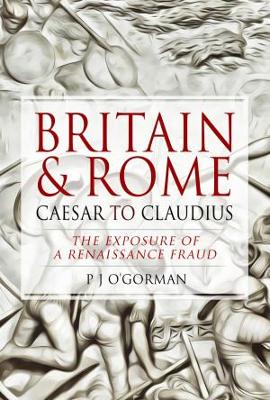Reviewed by annieb123 on
Britain and Rome: Caesar to Claudius The Exposure of a Renaissance Fraud is an accessible and well written examination of a contentious bit of early British history by P. J. O'Gorman. Due out 30th June from Pen & Sword Military, it's 224 pages and will be available in hardcover format.
Most of accepted history is built up in countless layers by historians starting from a common point and adding and filling out detail from newly (re)discovered sources. Occasionally, however, someone comes along and causes a sensation by refuting the commonly accepted basis, forcing a re-examination of the entire framework. In this case, the author has boldly stated that the stanchions of early British history, including Tacitus (who, according to O'Gorman, invented Boudicca whole cloth) and Cassius Dio who also was less factually inclined and more a writer of fiction. That later historians based their work on the shoulders of what were essentially writers of fiction (which may have been invented by later renaissance authors whole cloth), obviously casts our modern history into doubt.
I was fascinated by the boldness of the claims, and I do applaud the skepticism with which he examines and presents evidence piece by piece. I am not enough of a real scholar of history (more of a keen amateur), but I admit that I was fascinated and he certainly makes a cogent argument.
This is the sort of book which could either change the entire paradigm, or be debunked as the work of a crank by other academics. I'm a bioengineering nerd and my real bonafides lie in other fields, but I confess that I am fascinated by what he has to say. I am also enough of a history nerd to love the sort of "gauntlet throwing" language he uses in the book and I would love to see a peer-review of the work here.
For actual historians and fans of deep-diving subjects in history, the language is quite accessible, and the author has done a meticulous job with the annotations. It appears in my admittedly inexpert opinion, to be rigorously built up and correct. The maps, timelines, and facsimiles and photos helped to add a layer of context and helped me to keep track of the chief actors.
Five stars. I can't say absolutely without reservation that the author really knows what he's talking about, but he certainly seems to make a good case. I liked that he wasn't mealy-mouthed in the least about throwing down the gauntlet. I've made a note for myself to come back in a couple years and check the peer reviews for this book.
Disclosure: I received an ARC at no cost from the author/publisher for review purposes.
Reading updates
- Started reading
- Finished reading
- 10 May, 2022: Reviewed
